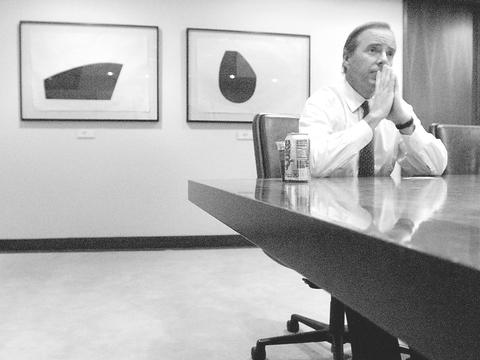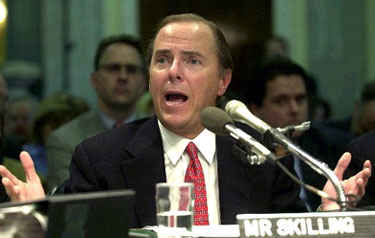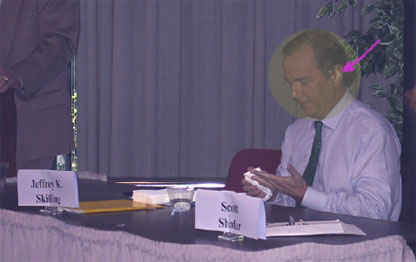|
Jeffrey Skilling
Jeffery Skilling became the COO of the Enron Corporation in 1990, pushing a strange idea: the company didn't really need any "assets". By pushing the company's aggressive investment strategy, he helped make Enron the nation's biggest wholesaler of gas and electricity, with $27 billion traded in the first quarter. He became the CEO, and personally earned $132 million in a single year. A decade later, he resigned as chief executive, for "personal" reasons. He openly admitted that he was stunned by Enron's horrific descent and by revelations that his former chief financial officer (and right-hand man) made more than $30 million from dealings with investment partnerships barely related to the company. Thousands of employees were left without jobs and retirement savings when Enron imploded in the fall of 2002. As multiple federal investigations loomed, former employees talked of shredding documents related to the collapse. When stories of continued shredding persisted, Enron posted security guards at its offices to stop possible further destruction of documents. Enron's bankruptcy filing was the biggest in U.S. history, encouraging former vice chairman Cliff Baxter to commit suicide.
James Greenwood, subcommittee chairman, said: "Mr Skilling, a massive earthquake struck Enron right after your departure. People in far inferior positions to you could see cracks in the walls, feel the tremors, feel the windows rattling. And you want us to believe that you sat there in your office and had no clue that this place was about to collapse?" Skilling's responses were overarching excuses which included "I was not aware," "I did not believe," "I did not have any knowledge," —but went well beyond the traditional "I do not recall". At one point he spun a charming anecdote about power outages in a West Palm Beach, Florida hotel, where executives—including himself—wandered in and out of the session while colleagues sat in the dark. It was during these "step outs," Skilling mused, that decisions must have been made without his knowledge, specifically those which led to Enron's downfall. It's easy to see how he earned the nickname of The CEO Who Wasn't There. He has since been charged with fraud, insider trading and other crimes—and posted his $5 million bond with a cashier's check.
At 4:00 a.m. on April 9, 2004, New York police officers responding to a complaint that an emotionally disturbed person was "pulling on people's clothes and shouting aloud with intent to annoy" found themselves face to face with none other than the former Enron CEO. Skilling was standing on the corner of Park Avenue and East 73rd Street: highly intoxicated, uncooperative, and making accusations at passers-by. "You're an FBI agent and you're following me," he was reported as shrieking. He ran up to several patrons in a Manhattan bar and "pulled open" their clothes. Police took Skilling to the New York Presbyterian Hospital for observation. |
 Skilling
was described by others as an intense, hands-on manager who let no detail of
his sprawling empire escape his reach—but when it came time to testify for
three hours before a cranky House Energy and Commerce Committee, he painted
quite a different picture. He portrayed himself as a distant, uninformed figure
who had no idea that millions of dollars of debt were being stashed away in off-the-books
partnerships. Enron was so big, he claimed, there would be no way he could possibly
know about everything going on in the company. "When I left on August
14, I thought the financial reports accurately represented the financial state
of the company," he said. "I fervently believed that Enron would continue
to be successful in the future—I did not believe the company was in any imminent
financial peril."
Skilling
was described by others as an intense, hands-on manager who let no detail of
his sprawling empire escape his reach—but when it came time to testify for
three hours before a cranky House Energy and Commerce Committee, he painted
quite a different picture. He portrayed himself as a distant, uninformed figure
who had no idea that millions of dollars of debt were being stashed away in off-the-books
partnerships. Enron was so big, he claimed, there would be no way he could possibly
know about everything going on in the company. "When I left on August
14, I thought the financial reports accurately represented the financial state
of the company," he said. "I fervently believed that Enron would continue
to be successful in the future—I did not believe the company was in any imminent
financial peril." But
people did manage to find Skilling, and share their opinions with him. At the
beginning of his speech to the Commonwealth Club of California, a sloppy pie
with red cherry filling was heaved at him by an activist. He wiped the pie from
his face and head, and as
But
people did manage to find Skilling, and share their opinions with him. At the
beginning of his speech to the Commonwealth Club of California, a sloppy pie
with red cherry filling was heaved at him by an activist. He wiped the pie from
his face and head, and as